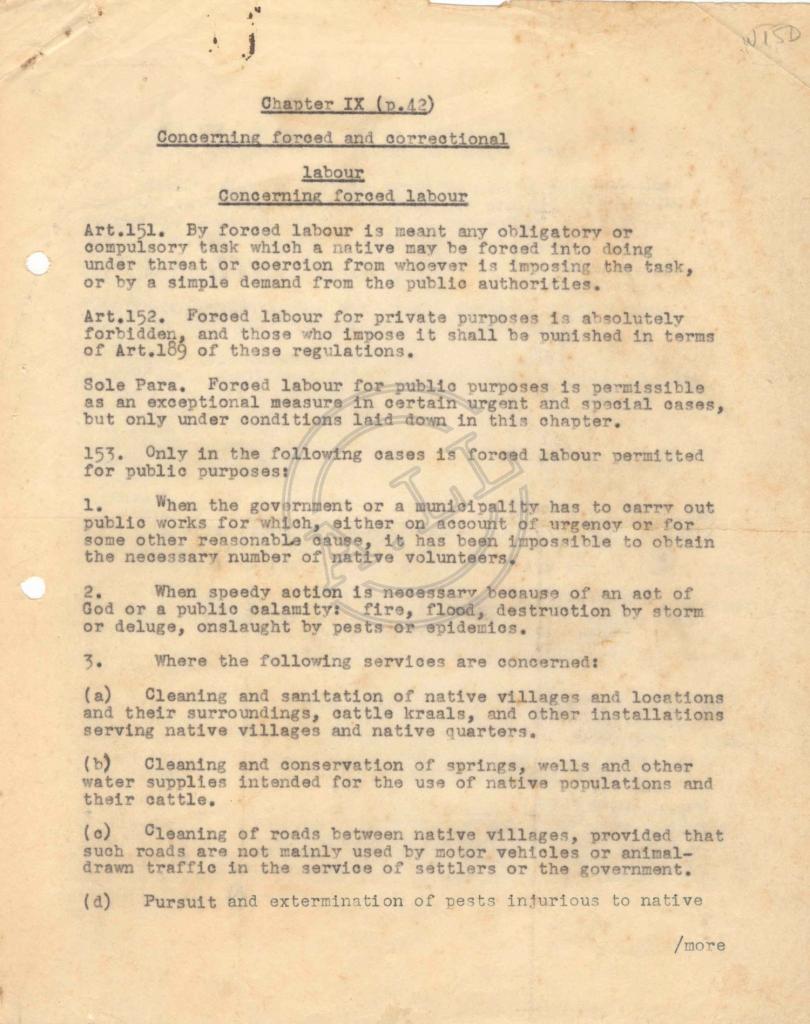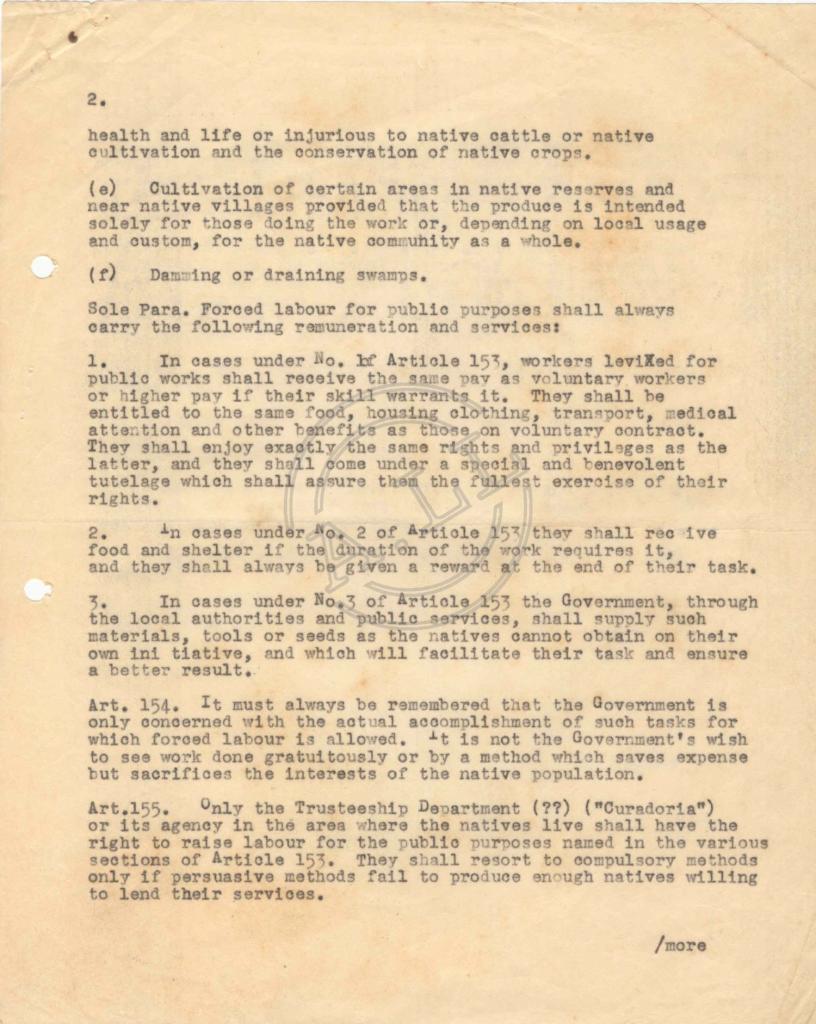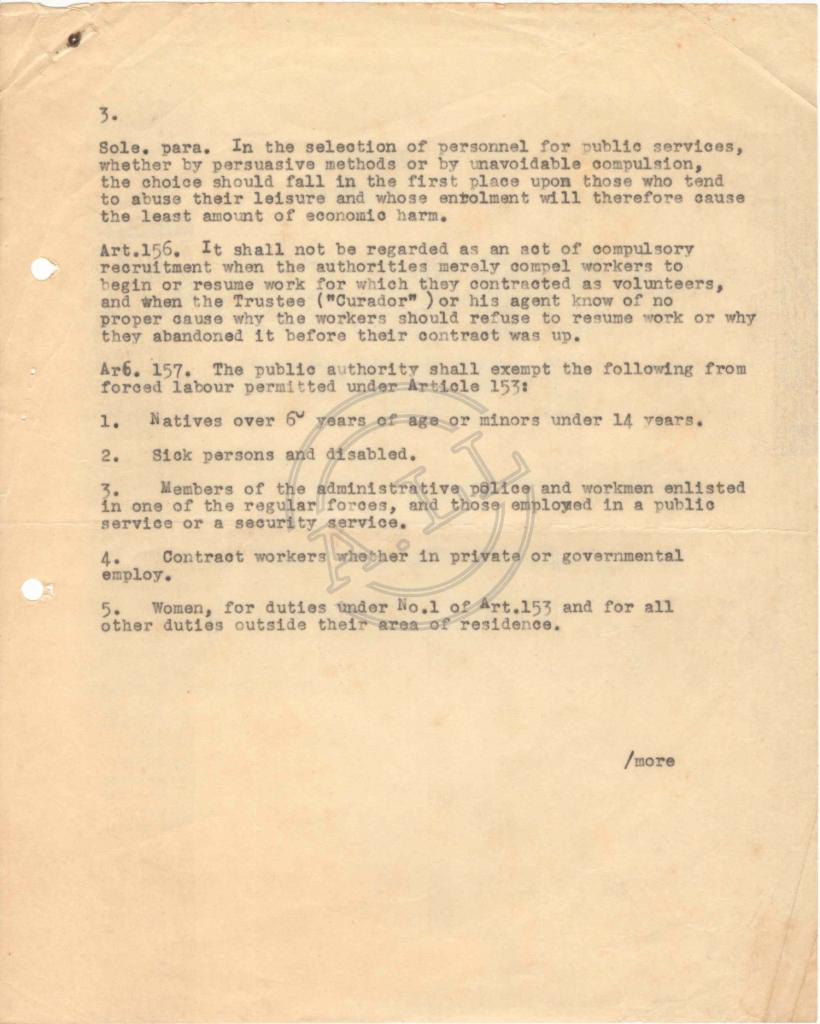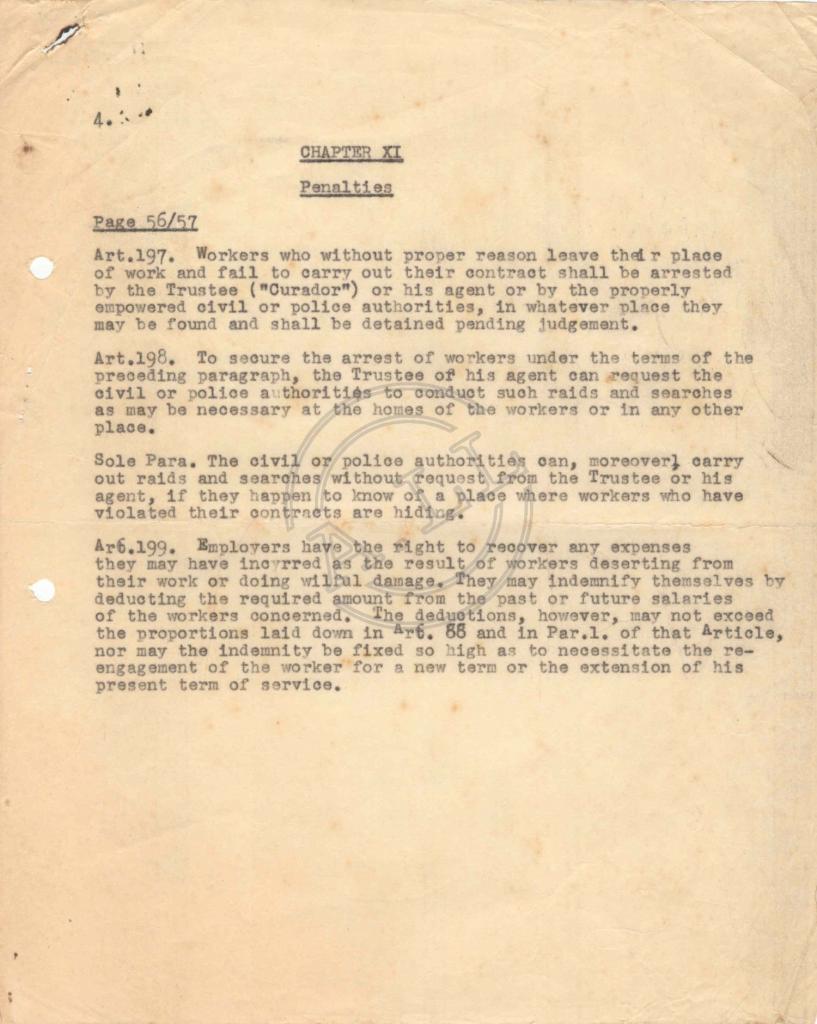Cota
0003.000.005
Tipologia
Correspondência
Impressão
Manuscrito
Suporte
Papel comum
Remetente
Basil Davidson
Destinatário
Lúcio Lara
Data
Idioma
Conservação
Razoável
Fundo
Imagens
5
Acesso
Público
Daily Herald
Editorial Office
TELEPHONE: TEMPLA BAR 1200.
TELEGRAMS: DAILY HERALD
LONDON.
Please quote our ref.
2-12 ENDELL STREET
LONDON, W.C.2
Chapter IX (p.42)
Concerning forced and correctional Labour
Concerning forced labour
Art.151. By forced labour is meant any obligatory or compulsory task which a native may be forced into doing under threat or coercion from whoever is imposing the task, or by a simple demand from the public authorities.
Art.152. Forced labour for private purposes is absolutely forbidden, and those who impose it shall be punished in terms of Art.189 of these regulations.
Sole Para. Forced labour for public purposes is permissible as an exceptional measure in certain urgent and special cases, but only under conditions laid down in this chapter.
153. Only in the following cases is forced labour permitted for public purposes:
1. When the government or a municipality has to carry out public works for which, either on account of urgency or for some other reasonable cause, it has been impossible to obtain the necessary number of native volunteers.
2. When speedy action is necessary because of an act of God or public calamity: fire, flood, destruction by storm or deluge, onslaught by pests or epidemics.
3. Where the following services are concerned:
(a) Cleaning and sanitation of native villages and locations and their surroundings, cattle kraals, and other installations serving native villages and native quarters.
(b) Cleaning and conservation of springs, well and other water supplies intended for the use of native populations and their cattle.
(c) Cleaning of roads between native villages, provided that such roads are not mainly used by motor vehicles or animal-drawn traffic in the service of settlers or the government.
(d) Pursuit and extermination of pests injurious to native health and life or injurious to native cattle or native cultivation and the conservation of native crops.
(e) Cultivation of certain areas in the reserves and near native villages provided that the produce is intended solely for those doing the work or depending on local usage and custom, for the native community as a whole.
(f) Damming or draining swamps.
Sole Para. Forced labour for public purposes shall always carry the following remuneration and services:
1. In cases under No. Lof Articles 153, workers levied for public works shall receive the same pay as voluntary workers or higher pay if their skill warrants it. They shall be entitled to the same food, housing clothing, transport, medical attention and other benefits as those on voluntary contract. They shall enjoy exactly the same rights and privileges as the latter, and they shall come under a special and benevolent tutelage which shall assure them the fullest exercise of their rights.
2. In cases under No. 2 of Article 153 they shall receive food and shelter if the duration of the work requires it, and they shall always be given a reward at the end of their task.
3. In cases under No. 3 of Article 153 the Government, through the local authorities and public services, shall supply such materials, tools or seeds as the natives cannot obtain on their own initiative, and which will facilitate their task and ensure a better result.
Art. 154. It must always be remembered that the Government is only concerned with the actual accomplishment of such tasks for which forced labour is allowed. It is not the Government’s wish to see work done gratuitously or by a method which saves expense but sacrifices the interests of the native population.
Art.155. Only the Trusteeship Department (??) (“Curadoria”) or its agency in the area where the natives live shall have the right to raise labour for the public purposes named in the various sections of Article 153. They shall resort to compulsory methods only if persuasive methods fail to produce enough natives willing to lend their services.
Sole. para. In the selection of personnel for public services, whether by persuasive methods or by unavoidable compulsion, the coice should fall in the first place upon those who tend to abuse their leisure and whose enrolment will therefore cause the least amount of economic harm.
Art.156. It shall not be regarded as an act of compulsory recruitment when the authorities merely compel workers to begin or resume work for which they contracted as volunteers, and when the Trustee (“Curador”) or his agent know of no proper cause why the workers should refuse to resume work or why they abandoned it before their contract was up.
Art.157. The public authority shall exempt the following from forced labour permitted under Article 153:
1. Natives over 6 years of age or minors under 14 years.
2. Sick persons and disabled.
3. Members of the administrative police and workmen enlisted in one of the regular forced, and those employed in a public service or a security service.
4. Contract workers whether in private or governmental employ.
5. Women, for duties under No.1 of Art.153 and for all other duties outside their area of residence.
CHAPTER XI
Penalties
Page 56/57
Art.197. Workers who without proper reason leave their place of work and fail to carry out their contract shall be arrested by the Trustee (“Curador”) or his agent or by the properly empowered civil or police authorities, in whatever place they may be found and shall be detained pending judgement.
Art.198. To secure the arrest of workers under the terms of the preceding paragraph, the Trustee of his agent can request the civil or police authorities to conduct such raids and searches as may be necessary at the homes of the workers or in any other place.
Sole Para. The civil or police authorities can, moreover, carry out raids and searches without request from the Trustee or his agent, if they happen to know of a place where workers who have violated their contracts are hiding.
Art.199. Employers have the right to recover any expenses they may have incurred as the result of workers deserting from their work or doing wilful damage. They may indemnify themselves
By deducting the required amount from the past or future salaries of the workers concerned. The deductions, however, may not exceed the proportions laid down in Art.88 and in Par.1. of that Article, nor may the indemnity be fixed so high as to necessitate the re-engagement of the worker for a new term or the extension of his present term of service.
Bilhete manuscrito de Basil Davidson a «Cher ami» [Lúcio Lara], acompanhado de «Chapter IX (p.42) Concerning forced labour» dactilografado em 2ª via
A publicação, total ou parcial, deste documento exige prévia autorização da entidade detentora.





